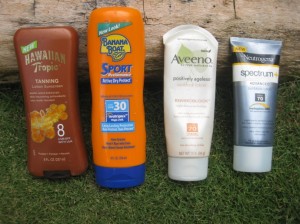New FDA Sunscreen Rules Highlight Sun Danger
By Laura Greene
With countless beaches and plentiful sunshine, Maui is a haven for sun-lovers. Safe and reliable sunscreens are, or should be, a part of daily life.
The sun can be good for you – the vitamin D that it provides is great for the body’s calcium absorption and catching some rays can also help to boost your mood. It can even be good for your skin – clearing up acne or other skin problems. However too much sun and the wrong sunscreen can have terrible consequences.
Your skin is your body’s largest organ and choosing a sunscreen that is safe for you and your family is key. Unfortunately there are lots of them out there that offer misleading claims of being “waterproof” or offer “instant protection.”
However new rules, which will be implemented in 2012 by the US Food and Drug Administration (FDA), will change labeling to give consumers a clearer idea of what their sunscreen really does and how it will help to protect them.
LeAndra Livingston, Executive Assistant at Maui Babe, says she welcomes the changes: “It will help people to use common sense, you trust what you see on the shelves and misinformation can be very dangerous – especially when you get into the sunscreens that have any SPF lower than 15. You can’t take risks in the sun and people need the right advice.”
The FDA’s new rules say that only “broad spectrum” products can claim to cut the risk of cancer and early aging. In order to qualify as broad spectrum, sunscreen products need to pass a test which proves they can protect against both UVA (which may contribute to cancer risk and premature aging) and UVB ( which causes painful sunburn and may increase your cancer risk).
The FDA will also cap SPF factors at 50+ and claims of “waterproof” or “sweat proof” sunscreen will be banned – replaced instead with “water resistant” and information on how long the product will really be effective.
“It’s not going to affect the way we operate.” added Livingston. “Our sunscreen is already SPF 30, we already protect against UVA and UVB rays and we have never claimed to be ‘waterproof’ just ‘water resistant’”
There are two most common types of skin cancer which affect one in five Americans; basal cell and squamous cell carcinomas, which are very curable. However, melanoma, the third most common skin cancer, is more dangerous and accounts for almost 79 per cent of all skin cancer deaths.
The Skin Cancer Foundation has also commended The FDA’s ruling: “We applaud the FDA for issuing its final regulations on sunscreens. Although science and technology have advanced over the past several years to dramatically improve the efficacy of sunscreens, there has long been a need to update the governmental regulations associated with them – particularly in the areas of UVA protection and product labeling. This announcement is a significant advancement for the FDA, which brings awareness to and acknowledges the importance of UVA protection in the prevention of skin cancer.”
The Skin Cancer Foundation also recommends taking the following precautions to keep yourself protected against the sun’s harmful rays:
•Seek the shade, especially between 10 a.m and 4 p.m.
•Never put yourself in a situation where you might burn.
•Avoid tanning and UV tanning booths.
•Cover up with clothing, including a broad-brimmed hat and UV-blocking sunglasses.
•Keep newborns out of the sun. Sunscreens should be used on babies over the age of six months.
•Examine your skin head-to-toe every month.
•See your physician every year for a professional skin exam.












